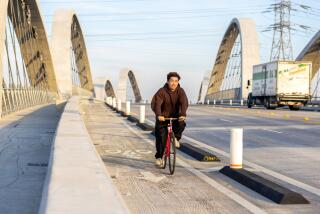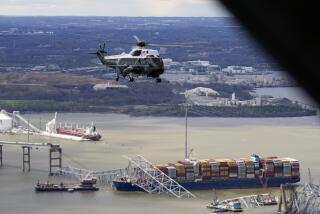America’s broken infrastructure
- Share via
When the World Trade Center went down in 2001, it led to two wars, hundreds of billions in expenditures and the creation of a Homeland Security bureaucracy. When the Interstate 35W bridge in Minneapolis went down last year, it led to a $1-billion House bill to mandate repair of federal bridges, which will probably be vetoed by President Bush if it gets past the Senate.
Obviously, neither the scale nor the causes of these two American tragedies are comparable, but the vastly different responses do say something about political will. The 9/11 attacks struck an emotional chord that infrastructure failures such as the I-35W bridge collapse or the ruined levees of New Orleans do not. Yet the consequences of our apathy about public infrastructure could be just as dire and deadly as our pre-9/11 apathy about Islamic extremism.
More than a quarter of the nation’s bridges are structurally deficient or functionally obsolete, and it would take $65 billion to fix them all. In 2006, almost 43,000 people died on U.S. roads and nearly 2.6 million were injured -- casualties that could have been reduced if more had been invested in safety improvements. Traffic congestion in big cities such as Los Angeles is choking off economic growth, and under-investment in public transit contributes to high gasoline prices and air pollution. And the federal fund that is devoted to solving many of these problems has run out of money.
The federal share of transportation projects is funded mostly by a tax of 18.4 cents a gallon on gasoline and 24.4 cents a gallon on diesel. The real value of the gas-tax fund has been steadily declining over the years because the tax hasn’t been raised since 1993, and it isn’t indexed to inflation. But the rapid rise in gas prices has worsened this decline; with people buying less, the tax proceeds are dropping fast. Transportation Secretary Mary E. Peters recently announced that a key account in the Highway Trust Fund, the one that funds most highway improvements, would run into the red this month unless Congress agreed to transfer money from the general fund.
Congress complied last week by passing an $8-billion rescue package for the Highway Trust Fund, a bill that Bush had formerly threatened to veto but is now backing. That’s because the administration has run out of options. If the federal government were to delay its highway payments to states, projects could be stalled and their costs would spike. Congress was right to approve the bailout, even though it compromises a 50-year-old philosophy that the users of the transportation network, not taxpayers as a whole, should pay for improving it.
But the bailout won’t solve the longer-term problem, which is threefold: The country doesn’t invest enough in transportation infrastructure, it often spends money on the wrong things, and the current gas tax is no longer a viable funding source. Congress will have to address all of these issues when it crafts the next transportation bill.
The 2005 transportation bill, which expires in September 2009, was a deeply embarrassing pork-fest -- the notorious Alaskan “bridge to nowhere” contained in the bill is still causing heartburn for its supporters in this year’s presidential race. The trouble with such earmarks is that they often aren’t among states’ top transportation priorities, so crucial needs such as repairing the I-35W bridge get ignored while lawmakers fund their pet projects.
Bush and Republican presidential candidate John McCain tend to blame earmarks for all the country’s infrastructure woes, but it isn’t that simple. Earmarks accounted for about $24 billion of the $286-billion transportation bill in 2005, or roughly 8% of the money. Yet a landmark report from the National Surface Transportation Policy and Revenue Study Commission estimates that it would take $225 billion a year for the next 50 years to sufficiently upgrade the nation’s crumbling infrastructure. Just cutting out pork won’t come close to covering that.
Actually, it’s tough to imagine any way of raising that kind of money, but the current system leaves ample room for improvement. To start with, the next transportation bill should contain zero earmarks. It should change the way federal funding is approved, making sure that only projects that serve the national interest are funded and that they are subject to cost-benefit analysis. It should encourage private funding of public infrastructure, such as toll roads and bridges, by removing roadblocks to such deals. It should also encourage innovative fundraising strategies such as urban congestion pricing and freeway toll lanes.
And lastly, something has to be done about the gas tax. The federal commission recommends raising it by 25 to 40 cents a gallon over five years, then indexing it to inflation. For the sake of our infrastructure, and for meeting the twin goals of improving the environment and weaning ourselves off foreign oil, that would be the right thing to do; it’s also completely impractical. At a time when high gas prices have become a defining political issue, there is no chance Congress would approve a gas-tax hike. So what then?
The vehicle mileage tax is probably the answer. Rather than taxing people based on the amount of gas they buy, it would tax them based on the number of miles they drive. Most likely, this would be done by installing tamper-proof devices in vehicles that would transmit mileage information to a tax office, though the data also could simply be confirmed by a certified mechanic. Some states are performing pilot studies on mileage taxes, but they’re a long way from having all the bugs worked out -- there are serious technical and logistics questions, not to mention privacy concerns (many people are uncomfortable beaming information about their driving habits to the government). Nonetheless, a mileage tax makes sense because it rightly puts the burden for building and maintaining roads on the shoulders of those who use them, even if they happen to drive high-mileage cars. The next transportation bill should at least invest in more study of these systems.
More to Read
A cure for the common opinion
Get thought-provoking perspectives with our weekly newsletter.
You may occasionally receive promotional content from the Los Angeles Times.






